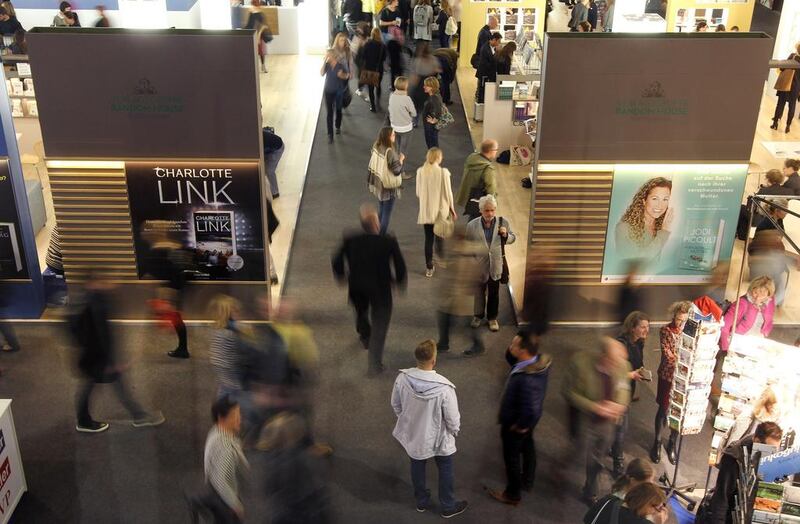It comes as little surprise that the world’s largest trade fair for books is now about far more than the written word.
Indeed, an anxiety about the future of the printed word seemed to hang like a cloud over the tens of thousands of publishers and industry types gathered at the five-day Frankfurt Book Fair, which ended on Sunday.
The looming threat of digitisation was as evident in the dozens of talks about e-books and social media as it was in the lines for virtual-reality demonstration booths.
Still, whatever the future might hold, for five days last week, printed matter of every imaginable size and shape was present and correct in truly breathtaking volumes.
With at least 7,000 exhibitors from more than 100 countries, you get the feeling there must be more than a million books on display, all artfully stacked under one roof – well, several roofs, as the fair spread across 13 floors in five sprawling aircraft hanger-esque halls.
Strolling through this ocean of books, the hardest thing to get to grips with – aside from a sense of literary vertigo – is that you cannot take any of them home with you for most of the event. Exhibitors are only allowed to sell their wares on the final day – which means the preceding four make you feel a bit like a child in a sweet shop with no pocket money.
A wander around this metropolis of words is as fascinating as it is frustrating. With impressive organisational precision, international publishers are arranged by country and region. So moving around the halls offers a world tour in representational etiquette, with nations juxtaposed by temperament as brash or exotic, playful or austere.
The UAE made a dignified appearance, with grand stands representing the Sharjah Book Authority, Abu Dhabi Book Fair and Dubai’s Mohammed Bin Rashid Al Maktoum Foundation.
On Thursday, midway through the fair, Dr Sheikh Sultan bin Mohammed Al Qasimi, Ruler of Sharjah, made an official appearance, during which he revealed that Sharjah will be the official guest of honour at the São Paulo International Book Fair – one of the largest and most important literary events in Latin America – in August 2018.
This news reflects the northern emirate’s growing global status as a cultural hub.
The Sharjah International Book Fair, which this year runs from November 2 to 12 and celebrates its landmark 35th edition, is the third-largest book fair in the world, dwarfed only by events in London and Frankfurt.
At the latter, vast expanses are devoted to diverse, at times dry, themes, including education, publishing solutions and stationary – there is a whole wing set aside for calendars.
While this sterility can become stifling, welcome relief came during the final two days of the event, when the doors were thrown open to the general public, who make up just over a third of the fair’s 275,000 visitors. Among them were thousands of giddy teenagers dressed for Halloween – sporting garish costumes including fairy-tale princesses, manga characters and comic-book superheroes and villains.
More dashes of colour were found in The Arts+, a new-for-2016 “fair within a fair” that pins its edgy charms on quirky decor and lively speakers tackling the theme “the business of creativity”.
Quite contrarily, this new outpost of hope sat next to the time-warp-stuck Antiquarian Book Fair.
Without any clear curation, and given that the exhibition space is open to (almost) anybody with the money to rent it, sparkling pockets of spiky discontent occasionally punctuate the walls of printed matter, with stands dedicated to political statements and controversial causes. Many of these issues were faced head-on at the tongue-twisting Weltempfang stage, which hosted a roster of panel talks tackling the concerns of an increasingly fractured contemporary Europe – extremism and populism, refugees and integration – with characteristic Germanic candidness.
On October 18, the day before the fair opened, the UAE’s key role as a strategic hub was highlighted as one of just seven nations represented at The Markets: Global Publishing Summit.
Sheikha Bodour bint Sultan Al Qasimi, founder and honorary president of Emirates Publishers Association and member of the International Publishers Association’s Executive Committee, told delegates how the UAE has grown from publishing only six books in 1970 to become the world’s 34th-largest book market.
Ahmed bin Rakkad Al Ameri, chairman of Sharjah Book Authority, hosted open meetings, telling publishers how the country’s book industry is now worth US$233 million (Dh855.7m), and is expected to triple by 2030. This was the 18th year Sharjah has been represented in Frankfurt.
Since 1976, the fair has welcomed an annual “guest of honour”, typically a country or geographic region. This year’s honorees, Flanders and the Netherlands, were represented in a kooky and fun form – with (impressively realistic) VR demo booths, a book doctor who could “diagnose” and prescribe a book to cure any ailment and chocolate tastings. It is this showcase role that Sharjah will play in Brazil two years from now.
For casual visitors, the outdoor plaza in Frankfurt forms the fair’s spiritual centrepiece. At one edge, amid rows of food-trucks, last year’s guest of honour, Indonesia, presented the “Island of Imagination”, a festival-like tent hosting live music and spoken-word performances. Strolling past – dodging caped crusaders, the sound of drums and the smell of French fries – it was easy to forget you were at a trade fair at all.
“We have a new definition of storytelling here,” says fair director Jürgen Boos, when quizzed on the event’s increasing diversity.
As the future of the written word continues to hang in the balance, that is undoubtedly a smart move.
rgarratt@thenational.ae





